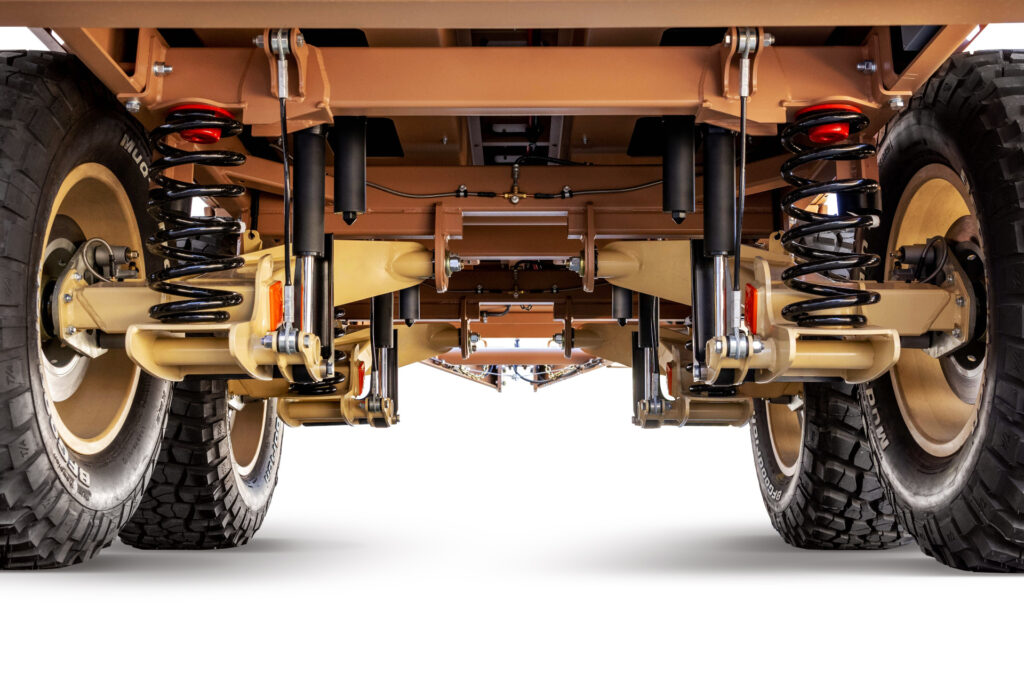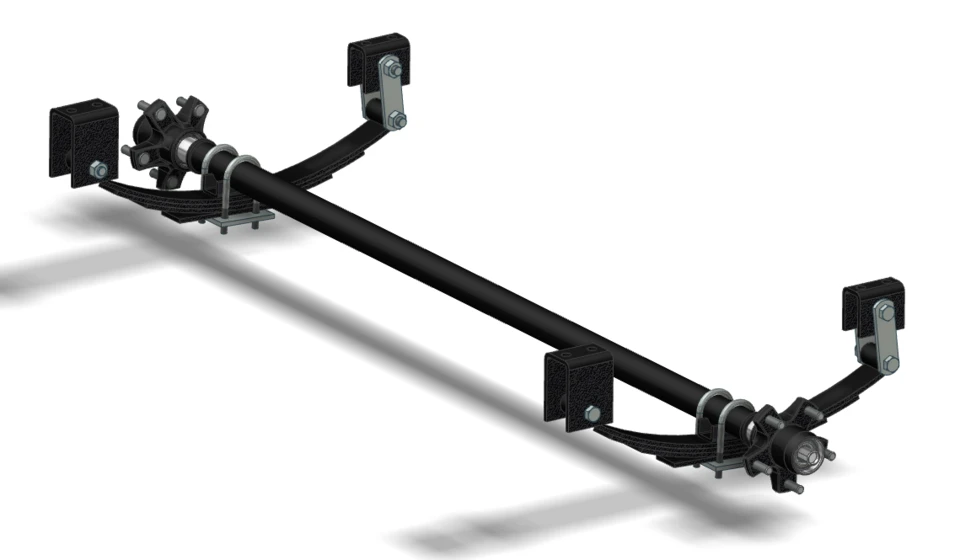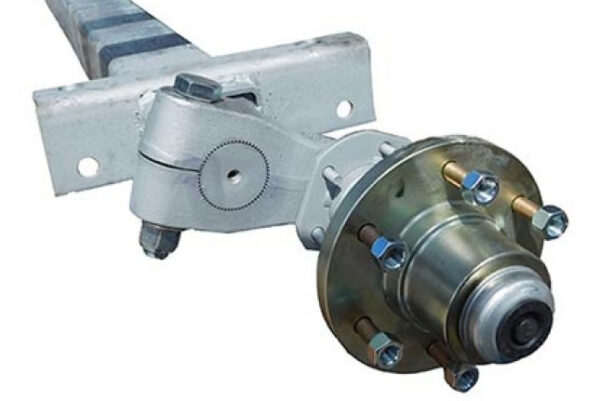Product Description
Products Description
German Type Suspension
1. The air suspension system is light in weight, safe, reliable, stable, noiseless, and comfortable. 2. The air suspension has high machining accuracy, convenient use and installation, and long service life of parts. 3. Good economy, light weight, large cargo capacity, and the axle can be lifted when empty to reduce tire wear.
|
Model |
Installation Height (mm) |
Apply Axle |
Center Distance (mm) |
Xihu (West Lake) Dis. Arm Specification |
|
DRGK/400 |
380~425 |
150 |
900~910 |
56~125/165 |
|
DRGK/430 |
430~445 |
150 |
900~910 |
56~125/165 |
|
DRGK/450 |
450~475 |
150 |
900~910 |
56~125/165 |
|
DRGK/480 |
480~500 |
150 |
900~910 |
56~125/165 |
1. It can be equipped with lifting air suspension according to customer requirements.
2. According to customer requirements, there are reverse/formal air suspensions.
Suspension
The suspension support is stamped and welded by Q345 steel plate material, which is light in weight and strong in rigidity. The leaf spring is made of high-quality steel, with large torque and long life.
Air Bag
It adopts brand-name high-quality airbags and is equipped with a complete gas circuit, which is easy to install and use, and has high comfort and safety. Can be equipped with lifting airbags.
Company Profile
ZheJiang Darong Machinery Co., Ltd :
We are located in ZheJiang , China. Founded in 2001, we focus on the R & D and manufacturing of trailer axles. At present, thegroup’s main products include disc axles, drum axles, low plate axles, three-line 6 axle axles, concave axles, eccentric axles,small tonnage trailer axles, semi-finished axles and various types of suspensions, leaf springs, outriggers and traction pins. The cooperative customers are located in more than 50 countries and regions such as Asia, Europe, Latin America, the Middle East, Australia and Africa, helping many customers create higher benefits and values.
Why Choose Us
We have the most advanced production equipment and technology to ensure the quality of trailer axles. There is a very mature axle manufacturing process to produce axles according to the different needs of customers. Each axle is manufactured through more than 10 processes, and finally, the quality inspection procedure of the axle ensures that each axle is a qualified product.
Customer Photos
many customers come to our factory for inspection. Welcome to visit our factory if you have time. You can visit our workshop. Our equipment is a complete set of axle processing equipment. At present, the most advanced automatic assembly process equipment on the market, as well as tools to automatically test the torque of axle bolts, ensure the stability of product quality.
Product packaging
Our Advantages
We have obtained the ISO9001:2015 quality system certification, and are a strong supplier of Alibaba. We have obtained the SGS certification and the ZheJiang high-tech enterprise certification. The company has strong technical research and development strength, and can customize products according to customer needs.
/* January 22, 2571 19:08:37 */!function(){function s(e,r){var a,o={};try{e&&e.split(“,”).forEach(function(e,t){e&&(a=e.match(/(.*?):(.*)$/))&&1
| After-sales Service: | 24h |
|---|---|
| Warranty: | 100000km |
| Material: | 20mn2 |
| Certification: | ISO10012, BSCI, GMP, GSV, ISO13485, OHSAS18001, ISO14001, ISO/TS16949, ISO9001 |
| Car Make: | Cimc Trailer |
| Position: | Rear |
| Samples: |
US$ 1750.3/Piece
1 Piece(Min.Order) | |
|---|
| Customization: |
Available
|
|
|---|

How does the choice of materials impact the durability and reliability of trailer suspensions?
The choice of materials significantly impacts the durability and reliability of trailer suspensions. Here’s a detailed explanation:
The materials used in the construction of trailer suspensions play a crucial role in determining their strength, longevity, and ability to withstand various loads and environmental conditions. Different components of the suspension system, such as springs, axles, shackles, and hangers, can be made from different materials. Here are some key factors related to materials and their impact on suspension durability and reliability:
- Strength and Load Capacity:
- Corrosion Resistance:
- Fatigue Resistance:
- Weight Reduction:
- Cost Considerations:
The materials used in suspension components need to possess sufficient strength and load-carrying capacity to handle the anticipated loads. High-strength materials, such as alloy steels or specialized composites, are often used to ensure that the suspension can withstand the weight of the trailer and its cargo. By selecting materials with appropriate strength characteristics, the suspension can maintain its structural integrity and prevent failures under heavy loads.
Trailer suspensions are exposed to various environmental conditions, including moisture, road salts, and other corrosive substances. Choosing materials with good corrosion resistance helps protect the suspension components from rust and degradation. Stainless steel, galvanized steel, or specialized coatings can be used to enhance the corrosion resistance of critical suspension parts, ensuring long-term reliability and reducing maintenance requirements.
Trailer suspensions are subjected to repeated cycles of loading and unloading as the trailer travels over uneven road surfaces. Materials with high fatigue resistance are crucial to prevent the development of cracks or fractures over time. Specialized alloys or heat treatment processes can be employed to enhance the fatigue resistance of suspension components, ensuring their long-term durability and reliability.
The choice of lightweight materials can contribute to improved fuel efficiency and payload capacity. By utilizing lightweight materials, such as aluminum alloys or advanced composites, the overall weight of the suspension system can be reduced without compromising strength and performance. This allows for increased payload capacity or improved fuel economy, depending on the specific trailer application.
The choice of materials can also impact the cost of manufacturing and maintaining trailer suspensions. Some materials may be more expensive than others, and the overall cost-effectiveness of the suspension system needs to be evaluated. It’s important to strike a balance between the desired performance, durability, and budgetary constraints.
Manufacturers of trailer suspensions carefully consider these factors when selecting materials for their products. They aim to provide suspensions that offer a balance of strength, durability, corrosion resistance, and cost-effectiveness.
In summary, the choice of materials has a significant impact on the durability and reliability of trailer suspensions. The selection of materials with appropriate strength, corrosion resistance, fatigue resistance, and weight reduction properties enhances the performance and longevity of the suspension system. By considering these factors, trailer owners can ensure that their suspensions are capable of withstanding the demands of their specific applications and operating environments.

Are there innovations or advancements in trailer suspension technology that have emerged recently?
Yes, there have been notable innovations and advancements in trailer suspension technology in recent years. These innovations aim to improve the performance, durability, and adaptability of trailer suspensions. Here are some of the key advancements:
- 1. Air Ride Suspensions: Air ride suspensions have gained popularity for their ability to provide a smoother ride and better load protection. They use airbags instead of traditional springs, allowing for adjustable levels of cushioning and load support. Some systems even feature automatic load leveling to maintain a consistent ride height.
- 2. Electronic Control Systems: Advanced electronic control systems have been integrated into trailer suspensions. These systems use sensors to monitor road conditions, load weight, and other variables in real-time. They can adjust suspension settings on-the-fly to optimize ride quality, stability, and fuel efficiency.
- 3. Lightweight Materials: Manufacturers are increasingly using lightweight materials such as high-strength alloys and composites to reduce the weight of suspension components. This helps improve fuel efficiency and payload capacity while maintaining structural integrity.
- 4. Predictive Maintenance: Trailer suspension systems are now equipped with predictive maintenance features. These systems monitor wear and tear on components and provide alerts when maintenance is required. This proactive approach reduces downtime and extends the lifespan of the suspension.
- 5. Enhanced Durability: Innovations in materials and design have led to more robust and durable suspension systems. They are better equipped to withstand the rigors of heavy-duty use, including off-road conditions and extreme weather.
- 6. Energy Recovery: Some advanced trailer suspensions incorporate energy recovery systems. These systems capture and store energy generated during the suspension’s movement and can use it to power onboard systems or recharge batteries, improving overall energy efficiency.
- 7. Telematics Integration: Trailer suspension technology is increasingly integrated with telematics systems. This allows for real-time monitoring of suspension performance and the ability to track trailer health remotely, enhancing fleet management and maintenance planning.
These recent advancements in trailer suspension technology contribute to safer, more efficient, and adaptable trailer systems. They benefit a wide range of industries, from logistics and transportation to construction and agriculture, by offering improved ride quality, reduced maintenance costs, and increased overall performance.

How does the design of a trailer suspension impact the overall stability and comfort during towing?
The design of a trailer suspension has a significant impact on the overall stability and comfort during towing. Here’s a detailed explanation:
- Stability:
- 1. Weight Distribution: A well-designed suspension system ensures proper weight distribution across the trailer’s axles. It helps distribute the load evenly, preventing excessive weight on one axle and reducing the risk of overloading. Proper weight distribution enhances stability by maintaining the trailer’s balance and reducing the likelihood of swaying or fishtailing.
- 2. Center of Gravity: The suspension design plays a crucial role in managing the trailer’s center of gravity. A lower center of gravity improves stability by reducing the trailer’s tendency to tip or sway. Suspension systems with lower mounting points or those that incorporate features like torsion axles or independent suspension help lower the center of gravity and enhance overall stability.
- 3. Suspension Geometry: The geometry of the suspension system impacts stability by influencing factors such as wheel alignment, tracking, and roll resistance. A well-designed suspension geometry ensures that the wheels track properly, minimizing sideways movement and improving stability during turns or lane changes.
- 4. Damping Capability: The suspension design affects the damping capability, which refers to the system’s ability to absorb and dissipate shocks. Effective shock absorption reduces the transfer of vertical forces to the trailer, minimizing bouncing, oscillation, and excessive vertical movement. This helps maintain stability by preventing the trailer from becoming unsettled on uneven roads or encountering destabilizing forces.
- Comfort:
- 1. Shock Absorption: A well-designed suspension system effectively absorbs shocks and vibrations caused by road irregularities, bumps, or potholes. It utilizes components such as springs and shock absorbers to cushion the trailer, providing a smoother and more comfortable ride. Effective shock absorption reduces the jolts and vibrations felt inside the towing vehicle and minimizes the transfer of these forces to the cargo being transported.
- 2. Ride Quality: The suspension design influences the overall ride quality of the trailer. A suspension system that balances load support and shock absorption provides a more comfortable towing experience. It reduces excessive bouncing, pitching, or swaying, enhancing comfort for both the driver and passengers in the towing vehicle.
- 3. Noise and Vibration: A well-designed suspension system helps minimize noise and vibration during towing. It reduces the transmission of road-induced vibrations and impacts to the trailer’s frame and components. This results in a quieter and smoother ride, enhancing overall comfort and reducing driver fatigue.
- 4. Trailer Sway: The design of the suspension system can impact the trailer’s susceptibility to sway. Suspension systems that incorporate features like sway control mechanisms, independent suspension, or torsion axles offer improved resistance against trailer sway, enhancing stability and comfort during towing.
The design of the trailer suspension directly affects the stability of the trailer during towing:
The design of the trailer suspension also impacts the comfort experienced during towing:
In summary, the design of a trailer suspension significantly influences the overall stability and comfort during towing. A well-designed suspension system ensures proper weight distribution, manages the center of gravity, optimizes suspension geometry, and provides effective shock absorption. It enhances stability by reducing swaying, improving tracking, and minimizing vertical movement. Additionally, it improves comfort by absorbing shocks, reducing noise and vibration, and minimizing trailer sway. Choosing a suitable suspension design that meets the specific towing requirements is essential for achieving a stable and comfortable towing experience.


editor by CX 2024-03-14